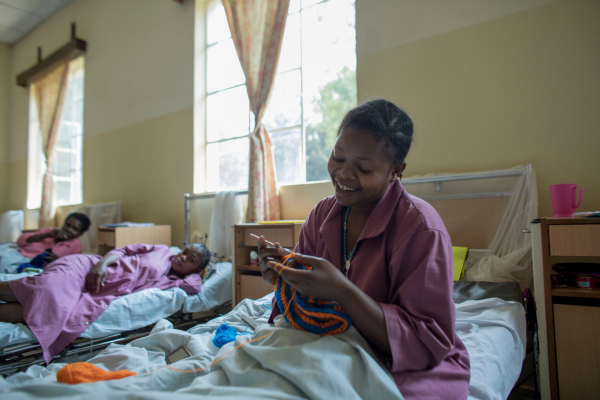Everyone Deserves Safe, High-Quality Health Care

As the year comes to a close, we find ourselves reflecting on Panzi’s history, dating back to 1999 when Dr. Mukwege opened Panzi Hospital. This was not an easy feat, with doctors working by candlelight, desperate for vital medical equipment, and, most importantly, constantly worrying about the immense need of the population they were seeking to serve.
Preserve a sanctuary for the vulnerable women and girls in our care.
2024 will mark Panzi Hospital’s 25th anniversary, and we are prioritizing upgraded security for the women, staff, and children in our care by updating the security equipment and infrastructure of the Panzi complex. These facilities are where survivors seek to begin their healing process in safety.
A continued need to focus on safety and security.
1996 marked the start of the First Congo War, as well as one of the first tragedies experienced by Dr. Mukwege during his career – the massacre at Lemera Hospital. One evening, while Dr. Mukwege was traveling, an armed group invaded the hospital and murdered all 37 patients and staff in cold blood. As one of the few medical facilities in the area, Lemera Hospital was left in ruins, depriving the community of much-needed healthcare services. The individuals who were killed had come to the hospital to seek not only medical treatment, but solace from the hardships they were enduring in the outside world.
Following this event, Dr. Mukwege felt an undeniable call to action. In 1999 he opened Panzi Hospital, with a vision to provide safe, world-class medical care to vulnerable women in the community with safe, high-quality maternal health care, given that DRC has some of the highest maternal mortality rates in the world. His first patients, however, were not delivering mothers, but instead, women who had been raped with extreme brutality and as a weapon of war as the conflict raged on. He and his staff quickly adapted to become reluctant experts in one of the worst specialties in the world: the treatment of severe gynecological trauma caused by conflict-related sexual violence. Since those early days, 80,000 survivors have been treated by Panzi to date, and its work has expanded to provide not only medical care, but holistic care, focusing on healing each woman from the inside out and preparing them for life outside of the complex.
Panzi has always placed a heavy emphasis on security, and has received support from outside organizations like MONUSCO (the United Nations peacekeeping mission in DRC). MONUSCO has played a significant role in protecting Dr. Mukwege, and therefore Panzi Hospital, after an assassination attempt on his life in 2012, by providing security on hospital grounds for almost ten years. However, as the status of MONUSCO’s mandate remains uncertain we feel immense need to find independent solutions to prioritize the safety of those survivors in our care, indefinitely.
The Ongoing Threat
According to The Safeguarding Health in Conflict Coalition (SHCC) there were “125 incidents of violence against or obstruction of health care in the DRC in 2022, a similar number to 127 in 2021. At least 50 health workers were kidnapped.” The majority of these cases have been in Eastern DRC. This is a result of “increased violence by the Allied Democratic Forces (ADF), the resurgent March 23 Movement (M23), and local Mai-Mai militias affected health workers and facilities in northeastern DRC” (SHCC). Health care facilities are often a target for violence in the DRC, the WHO reporting “32 attacks in 2022, causing 3 deaths and 7 injuries, and 19 attacks so far in 2023, causing 8 deaths and 1 injury, 16 impacting health facilities, 11 impacting supplies.” (WHO)
Violence surrounding health structures in the DRC has devastating consequences, disrupting essential medical services, leading to shortages of staff and resources, and causing entire facilities to close. This directly impacts people with chronic conditions and those requiring emergency care. Moreover, violence has decreased vaccination rates, hindering efforts to prevent outbreaks of preventable diseases. In fact, “Every two to three years, measles outbreaks affect tens or even hundreds of thousands of children in DRC. The largest epidemic was recorded in 2019, with over 300,000 suspected cases reported, including more than 6,000 deaths. Lack of access to vaccines and vaccination services exacerbate the situation.” (WHO).
The international community has also called on the DRC government to do more to protect health workers and facilities. In 2019, the UN Security Council adopted a resolution that called on all parties to the conflict in the DRC to respect the neutrality of healthcare facilities and personnel. However, there has been little progress on this front, and violence against health workers continues to be a major concern.
The need for security is clear.
Not only because every survivor deserves protection, support, and the chance to reclaim their lives in peace and safety, but also because without it, everyone’s health suffers as a result. Panzi’s staff and thousands of community members rely on the hospital to safeguard their lives in more than one way. At Panzi, they find a sanctuary, a place of healing where their voices are heard and their physical and emotional pain is acknowledged. Protecting the women, children, and staff in our care is our top priority. Without it, the health and wellbeing of all of our patients is at risk.
Survivors are a call to action for all of us. They are a reminder that together, we can be a force for change, a force for healing, and a force for justice. We ask your help to preserve a sanctuary for these women. They have endured the unimaginable and we must ensure that when they seek care with us, they feel completely safe.



